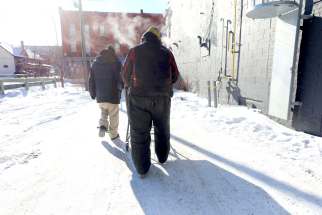Breaking dining-out rules will come back to bite us
Read this article for free:
or
Already have an account? Log in here »
To continue reading, please subscribe:
Monthly Digital Subscription
$0 for the first 4 weeks*
- Enjoy unlimited reading on winnipegfreepress.com
- Read the E-Edition, our digital replica newspaper
- Access News Break, our award-winning app
- Play interactive puzzles
*No charge for 4 weeks then price increases to the regular rate of $19.00 plus GST every four weeks. Offer available to new and qualified returning subscribers only. Cancel any time.
Monthly Digital Subscription
$4.75/week*
- Enjoy unlimited reading on winnipegfreepress.com
- Read the E-Edition, our digital replica newspaper
- Access News Break, our award-winning app
- Play interactive puzzles
*Billed as $19 plus GST every four weeks. Cancel any time.
To continue reading, please subscribe:
Add Free Press access to your Brandon Sun subscription for only an additional
$1 for the first 4 weeks*
*Your next subscription payment will increase by $1.00 and you will be charged $16.99 plus GST for four weeks. After four weeks, your payment will increase to $23.99 plus GST every four weeks.
Read unlimited articles for free today:
or
Already have an account? Log in here »
Hey there, time traveller!
This article was published 12/02/2021 (1760 days ago), so information in it may no longer be current.
It seems simple enough: if you want to eat with others at a restaurant or lounge under public health orders that took effect Friday, you have to live in the same household.
Done properly, this should be a low-risk activity. The people you’re potentially swapping droplets with while scarfing down nachos and swigging beer are the same ones you share air space with at home. No harm done.
The question is, how closely will people follow this rule?
The question is, how closely will people follow this rule?
That question could be applied to almost any public health order issued during the pandemic. However, considering the potential risks of people gathering in restaurants and lounges again (and the threat of the more contagious U.K. variant now in the province) how Manitoba responds to this order could be a game changer.
If this is not done well, we could be back to fall-level restrictions very quickly.
The difference between opening restaurants and lounges and easing other restrictions is that it allows groups of people to spend time together indoors for prolonged periods, without masks and in close proximity.
Normally, that would be a breeding ground for COVID-19 infection. But if it’s limited to household members, it shouldn’t be much different than a sit-down dinner at home. That’s a big “if.”
It’s the first time during the pandemic Manitoba has tried the household-only approach to indoor dining. There was a soft version of it during the first reopening last year. People were “urged” to stick with household members while dining, but it was flagrantly ignored.
The new rules state specifically that only members of the same household can sit together. Fines can be issued to people who violate the order.
There is nothing in the regulations that forces restaurants and lounges to verify addresses; only a requirement that “reasonable measures” are taken.
Trouble is, a lot of it is still based on the honour system. There is nothing in the regulations that forces restaurants and lounges to verify addresses; only a requirement that “reasonable measures” are taken. “Reasonable measures” is not defined, other than a suggestion it could include “requiring persons to present identification that shows their address.”
There is an onus on the operator to take measures; it’s just that the measures are not spelled out.
If it’s determined people sitting together are not from the same household, and a health inspector finds the operator did not take reasonable measures to verify addresses, the establishment (and the customers) could face heavy fines.
Dr. Brent Roussin, the chief provincial public health officer, gave an example Friday of what that could look like. He said if four people of similar age from different households were caught at the same table, the operator could be liable if no effort had been made to check IDs. Four people who appear close in age are probably not from the same household.
However, if a couple claimed to be living together, and it turned out they were from separate households, the restaurant may not be held responsible if there was no attempt to verify addresses, he said.
It’s unclear how any of this is supposed to work for licensed establishments, such as lounges. They operate under the same rules as restaurants, with the added restriction of a five-person limit per table. They can only sell alcohol to people who buy a meal. Considering most people go to lounges primarily to drink, and not eat, it’s unlikely many will be from the same household. It’s hard to imagine many people who live together, with the exception of some couples, going out drinking as a household.
Enforcement of food courts in shopping malls could be even trickier.
Enforcement of food courts in shopping malls could be even trickier. Food courts were a surprise addition to the public health orders this week. They are subject to the same rules as restaurants and lounges. Will malls have staff walking around checking tables and asking people if they are from the same household? They should.
There’s a lot that could go wrong with this order. Its success or failure depends entirely on how closely operators and customers follow the spirit and the letter of the law. Unlike the easing of most other restrictions, the stakes are much higher with this one.
tom.brodbeck@freepress.mb.ca

Tom has been covering Manitoba politics since the early 1990s and joined the Winnipeg Free Press news team in 2019.
Our newsroom depends on a growing audience of readers to power our journalism. If you are not a paid reader, please consider becoming a subscriber.
Our newsroom depends on its audience of readers to power our journalism. Thank you for your support.








